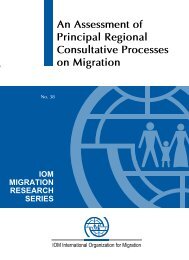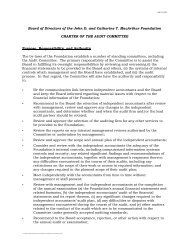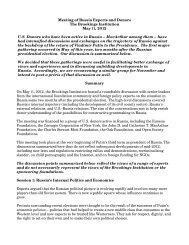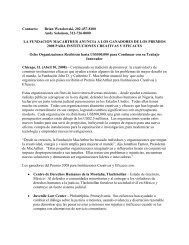A Global Compact on Learning - Brookings Institution
A Global Compact on Learning - Brookings Institution
A Global Compact on Learning - Brookings Institution
You also want an ePaper? Increase the reach of your titles
YUMPU automatically turns print PDFs into web optimized ePapers that Google loves.
head teachers and teacher training instituti<strong>on</strong>s to<br />
support progressive approaches to teaching and<br />
other quality improvements. A study looking at the<br />
effectiveness of teacher educati<strong>on</strong> in Pakistan highlighted<br />
the importance of head teacher support in<br />
sustaining improvements in the quality of classroom<br />
teaching and learning. 239 School leaders should<br />
work closely with teachers to establish learning objectives,<br />
implement appropriate assessment systems<br />
to m<strong>on</strong>itor progress, and hold teachers accountable<br />
to these standards. Changing gender norms should<br />
be reflected in school leadership and management,<br />
where inequalities often remain. School systems<br />
that have been effective in improving learning for<br />
their students have actively cultivated the next generati<strong>on</strong><br />
of educati<strong>on</strong> leaders and ensured a smooth<br />
transiti<strong>on</strong> of leadership and c<strong>on</strong>tinuity in sustaining<br />
l<strong>on</strong>g-term reforms. 240 This requires providing new<br />
principals with <strong>on</strong>going support, such as by pairing<br />
them with more experienced principals in mentoring<br />
programs.<br />
Comm<strong>on</strong> Strategy 2: Build Effective<br />
Assessment Systems Linked to Teaching<br />
and <strong>Learning</strong><br />
We cannot improve what we do not know. Simple<br />
low-cost assessment systems are needed that provide<br />
regular informati<strong>on</strong> at individual, school, and<br />
system levels. 241 Empirical research shows the benefits<br />
of assessments, when used correctly, <strong>on</strong> student<br />
learning. 242 Assessment systems are made up of different<br />
types of activities that serve multiple purposes:<br />
classroom assessments (primarily c<strong>on</strong>tinuous or<br />
formative in nature) that provide real-time informati<strong>on</strong><br />
to support teaching and learning in classrooms;<br />
examinati<strong>on</strong>s (primarily summative and high-stakes<br />
in nature) to make decisi<strong>on</strong>s about a student’s progress<br />
through the educati<strong>on</strong> system at distinct decisi<strong>on</strong><br />
points; and large-scale, system-level assessments<br />
for providing policy and programmatic informati<strong>on</strong><br />
<strong>on</strong> overall performance levels in the system. 243 Assessment<br />
exercises should include a gender analysis<br />
and require sex-disaggregated data in order to adequately<br />
track the impact of teaching and learning<br />
<strong>on</strong> boys and girls, respectively. Measuring learning<br />
should be d<strong>on</strong>e in a smart way that generates timely,<br />
useful informati<strong>on</strong> for policy, planning and classroom<br />
purposes but does not structure educati<strong>on</strong><br />
around testing. 244 It is important that learning not<br />
be reduced to that which can easily be measured.<br />
To build effective assessment systems linked to<br />
teaching and learning, four acti<strong>on</strong>s need to be taken:<br />
• Set clear learning targets.<br />
• M<strong>on</strong>itor teaching and learning processes<br />
early and regularly.<br />
• Ensure that examinati<strong>on</strong>s promote nati<strong>on</strong>al<br />
educati<strong>on</strong> excellence and equity goals.<br />
• Involve teachers, parents, local communities,<br />
and schools to understand and use informati<strong>on</strong>.<br />
The first needed acti<strong>on</strong> is to set clear learning targets.<br />
An important comp<strong>on</strong>ent of an effective assessment<br />
system is to work with key stakeholders up<br />
fr<strong>on</strong>t—including teachers, parents, and communities—to<br />
develop clearly articulated learning targets,<br />
preferably for each grade level. It is important to<br />
ensure that these targets are widely known by all<br />
key stakeholders. Just articulating these goals can<br />
provide policymakers with grounds for prioritizing<br />
what needs to be d<strong>on</strong>e. In resource-c<strong>on</strong>strained<br />
envir<strong>on</strong>ments, targets preferably should be localized<br />
to inform teaching and learning practices at<br />
the school level rather than relying <strong>on</strong> internati<strong>on</strong>al<br />
benchmarks for learning. 245 The curriculum should<br />
be closely aligned to the desired learning outcomes,<br />
and teachers should be involved as much as possible<br />
in designing any standardized assessment exercises<br />
that will be used to measure progress toward these<br />
outcomes. The current status of learning (if data exist)<br />
should be compared with expected levels, and<br />
should be analyzed to ensure that expected levels<br />
of learning, as exemplified by textbook c<strong>on</strong>tent and<br />
the nati<strong>on</strong>al curriculum, realistically reflect what a<br />
country is able to achieve in the short run. Unreas<strong>on</strong>able<br />
expectati<strong>on</strong>s often drive processes in educati<strong>on</strong><br />
systems rather than the needs of children, the<br />
capabilities of teachers, and the aspirati<strong>on</strong>s of parents.<br />
246 To reduce variability in school performance,<br />
countries should adopt time-bound, equity-based<br />
targets for achieving nati<strong>on</strong>al educati<strong>on</strong> goals, such<br />
as halving educati<strong>on</strong> disparities based <strong>on</strong> wealth,<br />
A <str<strong>on</strong>g>Global</str<strong>on</strong>g> Compa c t <strong>on</strong> <strong>Learning</strong>: Taking Acti<strong>on</strong> <strong>on</strong> Educat i o n in Developing Countries<br />
C e n t e r for Universal Educat i o n at <strong>Brookings</strong><br />
45






